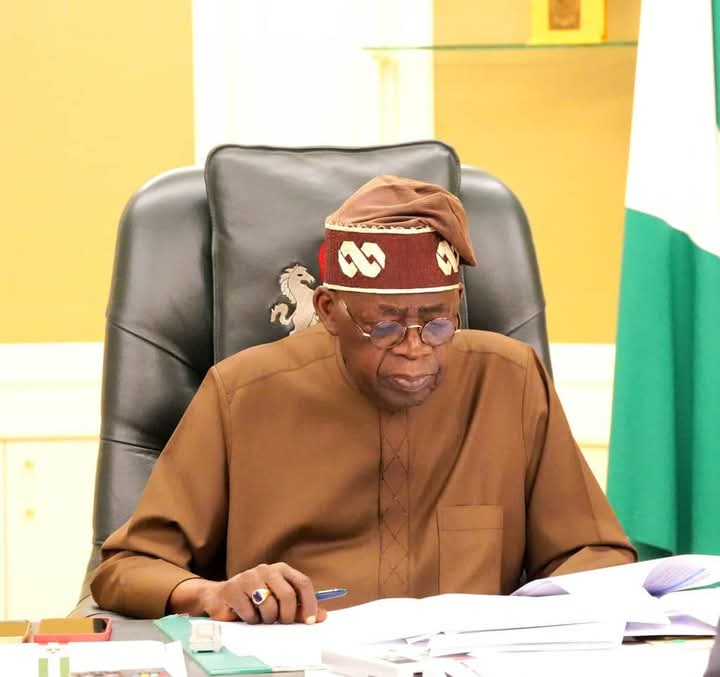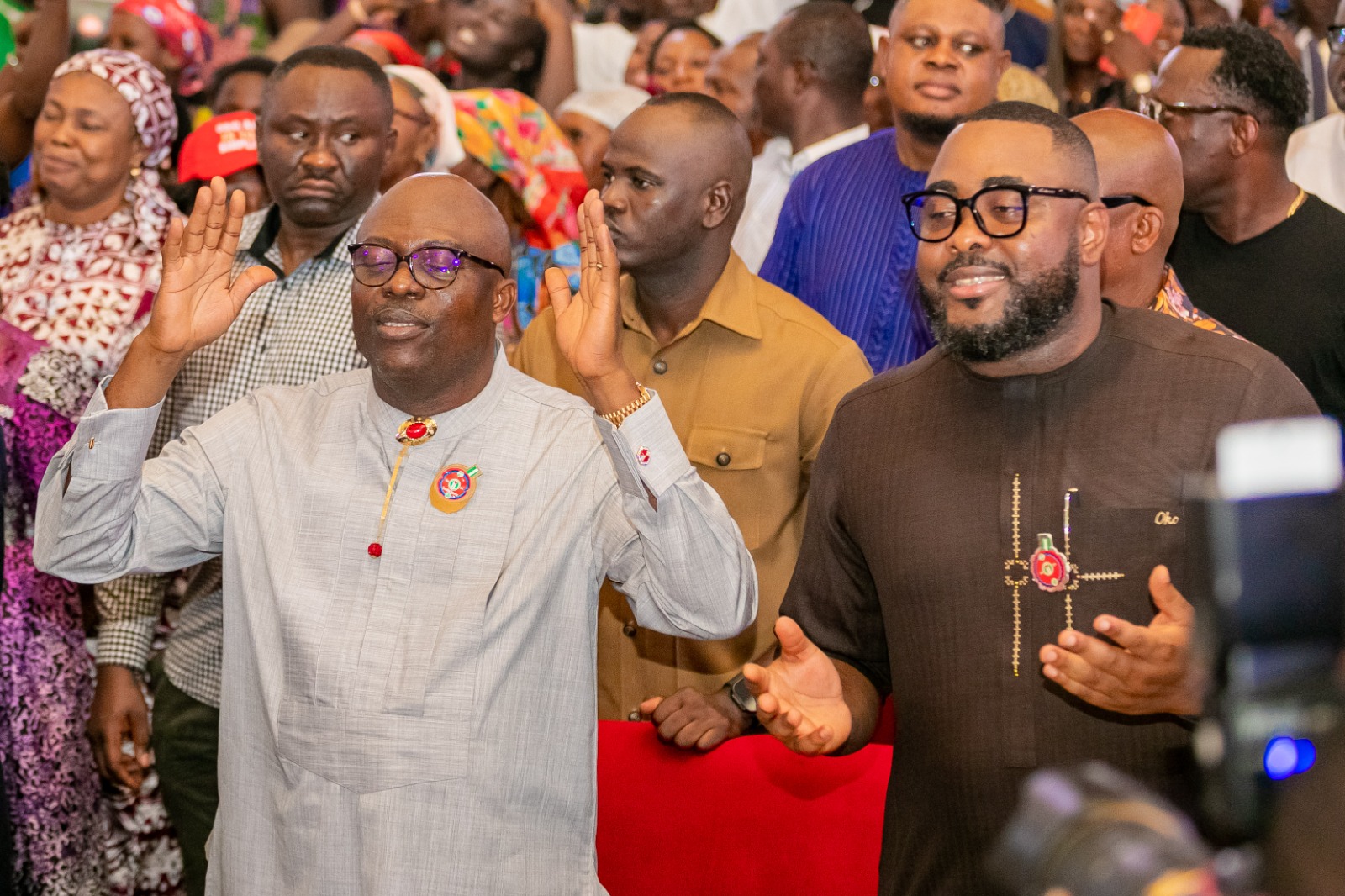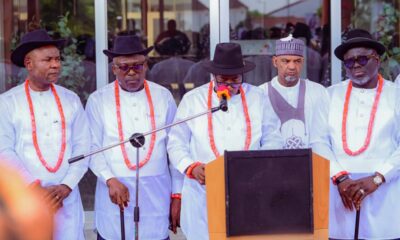Editorial
Nigeria: Beyond Anti-Corruption Anniversary
Recently, Nigeria joined other countries of the world to mark the annual global Anti-corruption Day. It is a day set aside by the United Nations, primarily to sensitise the global community on the debilitating effect of corruption on national development and for the assessment of efforts aimed at combating the scourge.
The theme of the 2010 World Anti-corruption Day is aptly chosen “Don’t Let Corruption kill Development” but more than any other factor, corruption has remained the major albatros militating against meaningful development in Nigeria.
In the language of the Political Bureau established in 1987, corruption takes many forms including: “…the inflation of government contracts in kickbacks, frauds and falsification of accounts in the public service, examination malpractices in our educational institutions including universities; the taking of bribes and pervasion of justice and various henious crimes against the state in the business and industrial sectors of our economy, in collusion with multi-national companies such as over-invoicing of goods, foreign exchange swindling, hoarding and smuggling”.
The celebration of the Anti-corruption Day was usually championed by some non-governmental organisations, such as Transparency International, but various nations support it through their anti-corruption agencies and institutions.
This year’s celebration was not different, the Independent Corrupt Practices and other related offences Commission (ICPC), the Economic and Financial Crimes Commission (EFCC), the Code of Conduct Bureau among others were all represented and as usual reeled off statistics indicating progress in the fight against corruption in Nigeria.
These statistics, however, neither reflect the dept of the scourge nor the perception of the average Nigerian who now sees corruption as part of our national public life, especially, because of the fact that those indicted for corruption hardly get any commensurate reprimand.
A clear case in point was the recent negotiated conviction of former Managing Director of Oceanic Bank, Mrs. Cecilia Ibru, after she agreed to forfeit a fraction of her loot.
Though the main institutions in the vanguard of Nigeria’s anti-corruption enforcement have continued to take the opportunity of the annual ritual of Anti-corruption Day, to give themselves pats on the back, they are not generally known to have improved their results.
Over the years, Nigeria has, indeed, maintained several legislative frameworks and policies for fighting corruption. Some of them include the Code of Conduct Bureau and Tribunal Act, the Money Laundering Act No 3 of 1995, Failed Bank Act No 16 of 1996, the Independent Corrupt Practices and other Related offences Act of 2000, the Economic and Financial Crimes Act, 2004 and the Budget Monitoring and Price Intelligent Unit. All are aimed at helping the anti-corruption agencies function effectively but there don’t seem to be any significant progress being made.
The Nigeria Police Force, the Code of Conduct Bureau, the ICPC and the EFCC are continuously perceived as standing still if not increasingly becoming ineffectual. And sure, the corruption ranking of Nigeria by the Transparency International based on such perceptions has not improved by any considerable margin since 2008 when the country was ranked 121st out of about 180 countries.
Since then, and in different parts of the world, a number of companies including Halliburton, Siemens, Wilbros, Nigeria LNG, and even officials of a Nigerian bank have been indicted for infractions, bribes and corrupt advantages in Nigerian business dealings.
But the silence of the Nigerian institutions that ought to co-operate with originating bodies and bring to book the Nigerian counterparts or accessories to crime in this regard, has not encouraged public trust and confidence in them.
On the other hand, the monumental corruption in our political life does not seem to be abating such that at both the executive and legislative bodies across the states and local government areas more havoc is being committed. Governors believe they are doing the people a favour by deciding who gets a chunk of juicy and overbloated contracts and who does not benefit and with the myopic connivance of the legislators who also share in these contracts through “oversight” committees and constituency project allocations, corruption reigns. At the local Government level, but for a few Chairmen that have tried to distinguish themselves in the way they try to address some basic needs for their localities, the entire tier of government may be turning into a statutory scandal with little or nothing to show for the average N100 million monthly allocation to the 774 local Government Areas in the country.
While tribalism remains a sign post of our national politics, corrupt practices and graft in the management of our national economy, have remained a uniting force because it seems all are agreed that the only way to justify ones presence in any public institution is to cut a chunk of the ‘national cake’ large enough to last for the tenth generation of one’s family members.
This tacit connivance by the generality of Nigerians accounts, no doubt, for the continued manifestation of corruption in our public and private lives and by extension for the absence of sustainable infrastructure and social amenities across the nation. It also accounts for the massive unemployment and the incremental poverty which over 80 percent of the Nigerian populace might be experiencing. Official corruption accounts for youth restiveness, illiteracy and all forms of social crime. It is to be blamed for the general state of insecurity because it is only when the nation’s resources are productively engaged that crime can be abated.
A look at the corrupt practices that rage in some Nigerian Public institutions such as the Nigeria Police Force, the Customs Service, Power Holding Company of Nigeria, (PHCN) the Nigerian National Petroleum Corporation (NNPC) and even at the nation’s educational institutions, gives little hope for a better tomorrow and calls for drastic and concerted action beyond the rhethrorics of annual celebrations.
The current realities call for intensification of pace in the war against corruption. Government and its agencies must move beyond slogans and talk shows and ensure intrepid investigations, diligent prosecutions and speedy but fair trial and punishment where deserved.
We say so because, no nation that hopes to develop and find itself among the developed nations of the world, as Nigeria is aspiring, will continue to condone leakages of its resources through avoidable corrupt practices.
Editorial
Israel-Gaza War: Sustaining The Ceasefire

Editorial
No To Hike In Telecom Tariffs

Nigerians are outraged by the Federal Government’s approval of a 50 per cent increase in telecommunications tariffs, with organised labour threatening to mobilise workers to boycott telecom services. The Nigeria Labour Congress (NLC) and the Trade Union Congress of Nigeria (TUC) have described the upcoming tariff as outrageous, lamenting that it will worsen the already harsh living conditions of workers and the masses.
Similarly, the Coalition of Northern Groups (CNG) rejected the hike, stating that it was ill-timed and did not take into consideration the struggles of Nigerians. The Human Rights Writers Association of Nigeria (HURIWA) also criticised the review, calling it an illegal, unconstitutional, and oppressive policy that undermines the fundamental rights and freedoms of Nigerians. It is a difficult moment for the industry.
Recall that the Nigerian Communications Commission (NCC) approved a 50 per cent increase in tariffs for telecom operators last Monday, instead of the 100 per cent raise that operators had requested. This decision quickly angered the consumers’ association, which criticised the government’s approval as not only punitive but also insensitive.
We wholeheartedly agree with the stance of labour and other groups on this very sensitive matter. We unequivocally condemn the 50 per cent increase in telecom tariffs. Though telecom operators cite higher operational costs and inflation as reasons for the hike, the timing and impact raise serious concerns in the current economic situation. It is a blatant attack on the well-being of the Nigerian worker and a betrayal of the people to corporate interests.
Telecommunication services are essential for daily communication, work, and access to information. However, the average Nigerian worker already spends approximately 10 per cent of their wages on telecom charges. For a worker earning the current minimum wage of N70,000, this means an increase from N7,000 to a staggering N10,500 per month or 15 per cent of their salary, a cost that is unsustainable.
This hike exemplifies the government’s apparent ease in prioritising corporate profits over citizens’ welfare. It is shocking that the government approved a 50 per cent tariff increase for telecom companies within a month, yet took nearly a year to approve the recent minimum wage for workers, despite the rising cost of living and inflation eroding purchasing power.
The questions are: When will the government stand up for the citizens it swore to protect? When will the National Assembly rise to its responsibility and hold the Executive accountable for policies that blatantly undermine the welfare of the majority? When will the common man finally heave a sigh of relief in Nigeria? We urge the government, the NCC, and the National Assembly to review the implementation of this ill-advised increase.
It is difficult to understand the state of mind of the managers of the nation’s economy. Sadly, these managers have alienated themselves from the reality of today. How can a government approve a 50 per cent hike in the tariff of telecom services when even the N70,000 minimum wage has been eroded by inflation, electricity tariff hikes, exorbitant fuel costs, transportation, and other social services?
Even if there is a need for an increase, why does it have to be 50 per cent? If, after dialogue, it is agreed that a raise is necessary, we should all consider a more reasonable increase rather than the 50 per cent hike. Fifty per cent is excessive and will only worsen the already harsh living conditions of workers, placing a heavier burden and more suffering on them and the general population.
The recognition of telecommunication services as essential components of modern society cannot be overstated. In an era characterised by rapid digital transformation, these services are fundamental not only for personal communication but also for facilitating broader socio-economic engagement. The proposed tariffs increase in the telecom sector raises critical concerns regarding equitable access to vital services that support communication, education, healthcare, and commerce.
In a democracy, the people should be the central focus of all government actions and policies. Every decision should aim to improve their quality of life. This plan must be carefully scrutinised with the welfare of citizens in mind. An increase in telecom tariffs will negatively impact many Nigerians, as the internet has become an essential tool for business, communication, and daily activities.
The Tide calls for the immediate suspension of the 50 per cent hike in tariffs. Instead, we recommend a more reasonable adjustment of a maximum of 10 per cent, which balances industry sustainability with the current economic realities in the country. We also demand that the NCC engages in genuine, inclusive consultations with consumer advocacy groups, civil society organisations, and other grassroots stakeholders before implementing any tariff adjustments.
Editorial
Hurray, Siminalayi Fubara Is 50!

Born on January 28, 1975, in Opobo Town, Mr. and Mrs. Joseph and Love Fubara welcomed their second of five children and first son. His father, a former soldier who completed an overseas training tour of duty, instilled in him a strong sense of discipline and dedication. His mother, a civil servant, taught him the importance of hard work and perseverance.
He received his primary education at Opobo Primary School and continued his studies at Comprehensive Secondary School in Opobo. His passion for numbers led him to pursue a degree in Accountancy at the then Rivers State University of Science and Technology, now known as Rivers State University.
Upon completion of his Bachelor’s degree, he pursued further education and obtained a Master of Business Administration (MBA) and a Master of Science (MSc) from the prestigious University of Port Harcourt in 2013 and 2016, respectively. Fubara’s dedication to his studies and his commitment to personal growth have shaped him into the accomplished individual he is today.
Sim, fondly called by his colleagues, started his career in 2003 as a principal accountant at the Rivers State Senior Secondary Schools Board. His dedication led to his promotion to Director of Finance and Accounts at the Government House in 2015. In March 2020, he was appointed Permanent Secretary and then became the Accountant-General of Rivers State on December 23, 2020.
His achievements are numerous, as he is a Knight of the St. Christopher (KSC) Order of the Church of Nigeria Anglican Communion. Additionally, he holds the prestigious traditional chieftaincy title of Amaopusenibo of Opobo Kingdom. The Governor’s commitment to family is evident through his marriage to Valerie Ibiere Fubara, with whom he shares three beautiful children.
Among Siminalayi’s other significant qualifications and accomplishments are his fellowship with the Nigerian Institute of Management and his fellowship with the Association of National Accountants of Nigeria (ANAN). He holds membership in the Chartered Institute of Forensic and Investigative Auditors. His impressive background has gained him the trust and support of the Peoples Democratic Party (PDP), leading to his victory in the party’s governorship primaries for the 2023 general elections.
Fubara embodies a leadership style defined by simplicity and compassion. He exhibits patience, confidence, and empathy in his interactions with those he serves. His humility and faith in God make him trustworthy. Representing the younger generation, Sim leads with the slogan “Consolidating and Continuing the New Rivers Vision,” focusing on developing infrastructure, healthcare, education, security, agriculture, and investment opportunities for Rivers State.
The bravery exhibited by His Excellency in resisting godfatherism has attracted respect from a wide array of Nigerians, Africans, and supporters of democracy around the world. He emphasises serving the interests of the people of Rivers over any godfather. His actions unify diverse groups in the state, promoting a sense of belonging among various ethnicities.
Our affable Governor exemplifies robust moral leadership rooted in his Christian beliefs. As a devoted Knight, he shows compassion and selflessness in his governance. He fosters an environment where all religions can peacefully coexist. Fubara sponsored Muslim pilgrims for the 2024 Hajj and personally wished them well, encouraging them to pray for the state and Nigeria. His religious tolerance has earned him respect among Nigerians who value coexistence.
Moreover, the Governor’s appealing physique and charming smile have garnered admiration from many Nigerians, who view physical beauty as a reflection of inner qualities. His tall stature has solidified his status as a revered figure, commanding respect across the nation. Fubara has shown dedication to women’s issues by initiating several programmes in collaboration with the Women Affairs Ministry and the Office of the First Lady, highlighting his strong commitment to women’s empowerment and gender equality.
Sir Fubara has focused on actively involving young people in his governance by launching entrepreneurship and training schemes, notably the Rivers State Youth Empowerment Scheme. His efforts to support youth have earned him the backing of many young Nigerians. Additionally, he provides scholarships and makes donations to orphanages, demonstrating his commitment to investing in education for the benefit of children in the state.
Known for his strong commitment to national unity, this Governor reaches out to Nigerians from various backgrounds. As a state Governor, he demonstrates great nationalism by supporting citizens from other states, especially in Rivers. He respects the rule of law and democratic values, which has enabled past local government chairmen to complete their terms without issues. His effective management of Rivers State’s resources promotes transparency and accountability.
Despite facing numerous distractions, the Rivers Chief Executive has made remarkable strides in steering the state’s affairs, reflecting his unwavering focus and commitment to delivering results. He has encountered challenges but remains dedicated to his vision for a better state. His peaceful and caring leadership style has made him popular, inspiring new leaders to emulate similar qualities. By being strong yet compassionate, he has redefined the concept of leadership. Fubara’s selfless nature prioritises the state’s needs above his own. This has earned him widespread support.
As he commemorates his Golden Jubilee birthday today, even the most ardent critics, adversaries, and accusers cannot overlook that he embodies a worthy precursor in every sense.
Happy Birthday, His Excellency!
-
Rivers7 hours ago
NOSDRA D-G Disburses N150m To 300 Farmers In Rivers
-

 Niger Delta5 hours ago
Niger Delta5 hours agoOgoni Postgraduate Forum Tasks HYPREP On Scholarship Scheme
-
Business7 hours ago
NCDMB Assures Greater Local Industry Participation In Oil, Gas Projects
-

 News9 hours ago
News9 hours agoNigeria Strengthens Economic Ties With Germany To Boost Investment, Jobs
-

 Featured6 hours ago
Featured6 hours agoFubara Flags Off Upgrading Of 135 Primary Healthcare Facilities In Rivers
-
Rivers7 hours ago
Bonny Protest Neglect, Seeks CSR MoU Implementation
-
Nation5 hours ago
FG Begins Tolling On Abuja-Keffi-Akwanga-Makurdi Highway
-
Business7 hours ago
NDYC Seeks NDDC Commercialisation … Uncompleted Projects Completion

